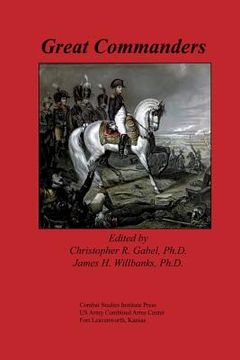Reseña del libro "Great Commanders (en Inglés)"
The command of military forces in combat is unlike any other field of human endeavor. If war is the ultimate form of human competition, then the commander is the ultimate competitor. The commander operates in an environment of chance, uncertainty, and chaos, in which the stakes are, quite literally, life and death. The commander is ultimately responsible for every variable that factors into military success or failure-training, logistics, morale, equipment, planning, and execution. The commander reaps the lion's share of plaudits in victory, but also must accept the blame in defeat, warranted or not. Very often the line that separates fame and ignominy is slender indeed. It is not difficult to identify "great" commanders, though the overwhelming majority of generals who win battles are never considered "great." The truly great commander is generally considered to be one who attains the unexpected or the unprecedented; one who stands above his contemporaries through his skill on the battlefield, or through the sheer magnitude of his accomplishments. In selecting the seven great commanders presented in this volume, the contributors sought to cover a wide spectrum of military endeavor, encompassing a very broad time-frame, different nationalities and cultures, and representatives from ground, sea, and air warfare. The commanders selected were masters of warfare in their particular time and environment. Each capitalized upon the social, political, economic, and technological conditions of his day to forge successful military forces and win significant and noteworthy victories that profoundly altered the world in which he lived. In regards to social context, the societies from which these seven leaders sprang varied tremendously, ranging from the nomadic tribal cultures of Asia to American industrial-age egalitarianism. Each commander faced particular challenges in operating within the social norms of his day and age. These norms govern how leaders are selected, who serves in the military, and to what purpose military operations are conducted. The great commander recognizes these norms, and extracts the maximum possible military effectiveness from them. Similarly, this study embraces a wide variety of political contexts. Each of the seven commanders herein proved adept at operating within the political milieu of his era, understanding if not manipulating the political systems of his country to best advantage. Three of the seven were not only great commanders but also sovereign rulers. Warfare is also closely shaped by its economic context, and the commanders in this study were both enabled and restrained by the economic world in which they lived. Ultimately, economics determines how many men, how much materiel, and how much treasure can be expended in waging any given war, and the successful commander makes the most of the resources his economy affords him. Technology is commonly thought to be one of the key determinants in victory or defeat, but wars won chiefly through technological superiority are actually rather rare in history. Finally, each of the commanders in this study demonstrated extraordinary qualities of leadership in the cauldron of combat. Moral courage, force of will, and a capacity for critical reasoning under stress are all required for a commander to succeed in the chaos, fog, and friction of war. All of the commanders represented in this volume possessed these traits to a remarkable degree. Many other generals could have been included-some familiar names will be conspicuous by their absence. Since the circumstances and context of every war differ, there is no intent to prove that these are the "greatest" seven commanders ever-any attempt to apply a "scorecard" mentality to war as practiced in different places and times is essentially futile. The commanders selected for this volume include: Alexander the Great, Genghis Khan, Napoleon Bonaparte, Horatio Nelson, John J. Pershing, Erwin Rommel, and Curtis LeMay

